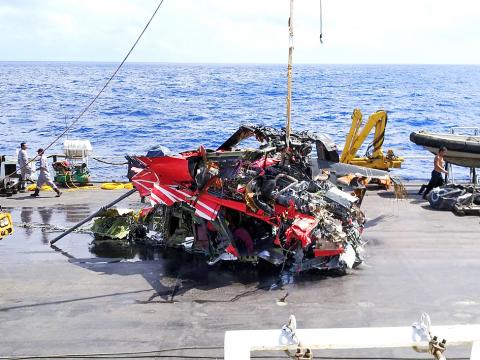The pilots’ lack of training and turbulence contributed to the crash of a National Airborne Service Corps (NASC) NA-907 helicopter in February last year, a Taiwan Transportation Safety Board (TTSB) investigation has determined.
According to the report released yesterday, the Sikorsky UH-60 Black Hawk helicopter, which had been deployed to bring a patient from Orchid Island (Lanyu, 蘭嶼) to Taitung on Feb. 5, crashed into the sea about 81 seconds after taking off from Lanyu.
All six people aboard were killed, but four bodies were never recovered.

Photo courtesy of the Aviation Safety Council
Debris from the helicopter was later retrieved from a depth of about 1,000m below the surface, but the cockpit and tail have never been found, the report said.
The pilots lacked the ability to manage the threat to the aviation environment, to detect and communicate problems and to take decisive actions in emergency situations, Aviation Occurrence Investigation Division Director Chang Wen-huan (張文環) said.
Their recorded conversations in the cockpit also showed that they were deficient in their understanding of the aircraft’s operating system, he said.
“They did not use the correct takeoff mode when they departed at nighttime and when there was a variable wind. They also failed to maintain a safe ascending altitude and speed during the takeoff stage. When they encountered turbulence, they did not detect in time the changes in altitude and speed and respond accurately to the situation,” he said.
“It was also possible that they were experiencing spatial disorientation. Failing to heed that their aircraft was at a low altitude, the pilots then applied excessive horsepower and operated at a large angle of depression, which caused the aircraft to crash into the sea,” Chang said.
The pilots encountered a downwind about 23 seconds after takeoff, with the wind speed at one point reaching 40 nautical miles per hour (74kph), the board found.
However, the aircraft could have still safely operated despite the wind shear and the turbulence, and dashboard data did not indicate that the helicopter had any abnormalities, it said.
In addition, the investigation found that the NASC had failed to comply with standard operating procedures for Black Hawk helicopters and to have a comprehensive training plan and resources for pilots flying them, it said.
Under normal circumstances, a helicopter pilot should spend about 190 hours training in a flight simulator before being given an assignment, but the two pilots involved had only 90 hours, Chang said.
However, because the NASC had not stipulated minimum simulation training hours, it did not infringe any regulations, he added.
The board report offered several suggestions to improve the NASC’s operational safety: reinforce pilots’ aviation threat management, emergency detection and decisionmaking abilities and enhance pilots’ knowledge of aircraft functions.
The NASC should stipulate standards that pilots have to meet before they are given a flight assignment, such as minimum hours spent on simulators, and establish rules governing the nighttime delivery of patients, the board said.
The NASC’s training standards for pilots is to be reviewed and the board will decide whether to accept them after comparing them with those in other nations.
The board also asked Civil Aeronautics Administration (CAA) to enhance the lighting and guiding functions on Lanyu Airport’s runway to deal with night flights.
If that is not possible, the CAA should quickly stipulate operating procedures for helicopters departing from the airport at night, the board said.

Taiwan is to commence mass production of the Tien Kung (天弓, “Sky Bow”) III, IV and V missiles by the second quarter of this year if the legislature approves the government’s NT$1.25 trillion (US$39.78 billion) special defense budget, an official said yesterday. Commenting on condition of anonymity, a defense official with knowledge of the matter said that the advanced systems are expected to provide crucial capabilities against ballistic and cruise missiles for the proposed “T-Dome,” an advanced, multi-layered air defense network. The Tien Kung III is an air defense missile with a maximum interception altitude of 35km. The Tien Kung IV and V

The disruption of 941 flights in and out of Taiwan due to China’s large-scale military exercises was no accident, but rather the result of a “quasi-blockade” used to simulate creating the air and sea routes needed for an amphibious landing, a military expert said. The disruptions occurred on Tuesday and lasted about 10 hours as China conducted live-fire drills in the Taiwan Strait. The Civil Aviation Administration (CAA) said the exercises affected 857 international flights and 84 domestic flights, affecting more than 100,000 travelers. Su Tzu-yun (蘇紫雲), a research fellow at the government-sponsored Institute for National Defense and Security Research, said the air

A strong continental cold air mass is to bring pollutants to Taiwan from tomorrow, the Ministry of Environment said today, as it issued an “orange” air quality alert for most of the country. All of Taiwan except for Hualien and Taitung counties is to be under an “orange” air quality alert tomorrow, indicating air quality that is unhealthy for sensitive groups. In China, areas from Shandong to Shanghai have been enveloped in haze since Saturday, the ministry said in a news release. Yesterday, hourly concentrations of PM2.5 in these areas ranged from 65 to 160 micrograms per cubic meter (mg/m³), and pollutants were

Taiwan’s armed forces have established response protocols for a wide range of sudden contingencies, including the “Wan Chun Plan” to protect the head of state, the Ministry of Defense (MND) said today. After US President Donald Trump on Saturday launched a series of airstrikes in Venezuela and kidnapped Venezuelan President Nicolas Maduro, concerns have been raised as to whether China would launch a similar “decapitation strike” on Taiwan. The armed forces regularly coordinate with relevant agencies and practice drills to ensure preparedness for a wide range of scenarios, Vice Minister of National Defense Hsu Szu-chien (徐斯儉) told reporters before a